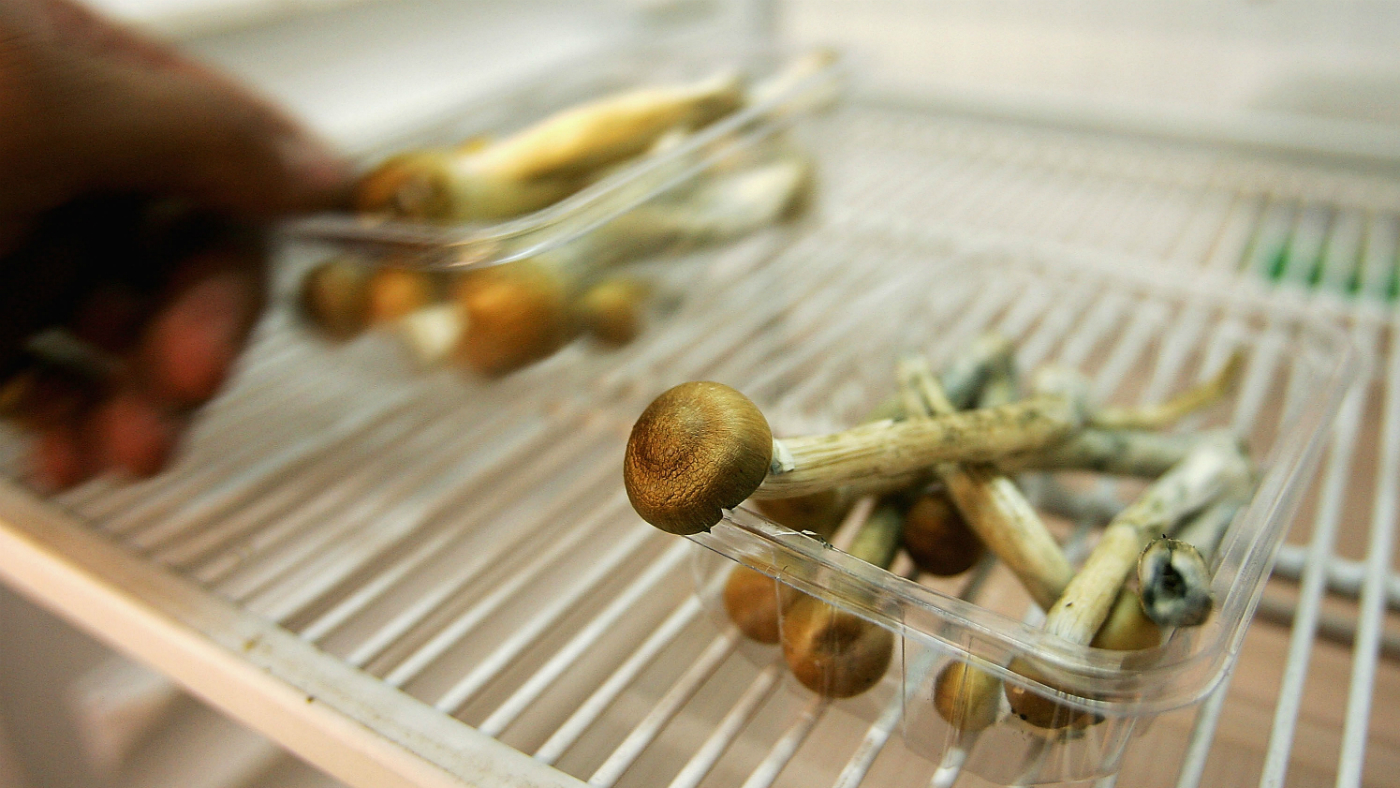Magic mushrooms 'reduce depression in cancer patients'
Single dose of psilocybin can boost mental wellbeing for up to six months, according to two clinical trials

A free daily email with the biggest news stories of the day – and the best features from TheWeek.com
You are now subscribed
Your newsletter sign-up was successful
The psychedelic trip produced by magic mushrooms can lift anxiety and depression in people dealing with life-threatening cancer, according to two clinical trials in the US.
Researchers from Johns Hopkins University in Baltimore and NYU Langone Medical Centre in New York carried out trials on a total of 80 volunteers with cancer who had reported symptoms of depression and anxiety.
Participants were given either a high dose of psilocybin, the active ingredient in magic mushrooms, o or a placebo. They then took part in a psychotherapy session during which they were encouraged to focus on their inner experiences while researchers monitored them. A few weeks later, the patients had a second session with the other drug.
The Week
Escape your echo chamber. Get the facts behind the news, plus analysis from multiple perspectives.

Sign up for The Week's Free Newsletters
From our morning news briefing to a weekly Good News Newsletter, get the best of The Week delivered directly to your inbox.
From our morning news briefing to a weekly Good News Newsletter, get the best of The Week delivered directly to your inbox.
In the Johns Hopkins study, 83 per cent of participants reported "decreases in measures of depression, anxiety and mood disturbance, and increases in measures of quality of life, life meaning, death acceptance and optimism", New Scientist reports.
The effect appears to be long lasting. "Six months after the final session of treatment, about 80 per cent of participants continued to show clinically significant decreases in depressed mood and anxiety," Medical Xpress reports.
The Guardian reports that the effects of magic mushrooms have been of interest to psychiatry since the 1950s, but the hardening of the US government's attitude towards recreational drug use after the late 1960s created "daunting legal and financial obstacles to running trials" with psychedelics.
A further practical difficulty in assessing hallucinogenics objectively is that participants in clinical trials are not supposed to know if they have received the real drug or a placebo, but the side effects of psychedelic drugs mean patients can tell if they have taken them.
A free daily email with the biggest news stories of the day – and the best features from TheWeek.com
Stephen Ross, the lead investigator on the NYU Langone trial, believes psilocybin's impact on patients' wellbeing far outstrips current treatment options, although he recognises the need for more research.
Between 40 and 50 per cent of cancer patients will develop depression or anxiety, but the current treatment options, such as antidepressants, "really don't work any better than placebo", he said.
If larger trials produce the same results, Ross says "psilocybin potentially could be rescheduled to become a prescription medication for cancer-related anxiety and depression".
-
 Hyatt chair joins growing list of Epstein files losers
Hyatt chair joins growing list of Epstein files losersSpeed Read Thomas Pritzker stepped down as executive chair of the Hyatt Hotels Corporation over his ties with Jeffrey Epstein and Ghislaine Maxwell
-
 Political cartoons for February 17
Political cartoons for February 17Cartoons Tuesday’s political cartoons include a refreshing spritz of Pam, winter events, and more
-
 Alexei Navalny and Russia’s history of poisonings
Alexei Navalny and Russia’s history of poisoningsThe Explainer ‘Precise’ and ‘deniable’, the Kremlin’s use of poison to silence critics has become a ’geopolitical signature flourish’
-
 Home Office worker accused of spiking mistress’s drink with abortion drug
Home Office worker accused of spiking mistress’s drink with abortion drugSpeed Read Darren Burke had failed to convince his girlfriend to terminate pregnancy
-
 In hock to Moscow: exploring Germany’s woeful energy policy
In hock to Moscow: exploring Germany’s woeful energy policySpeed Read Don’t expect Berlin to wean itself off Russian gas any time soon
-
 Were Covid restrictions dropped too soon?
Were Covid restrictions dropped too soon?Speed Read ‘Living with Covid’ is already proving problematic – just look at the travel chaos this week
-
 Inclusive Britain: a new strategy for tackling racism in the UK
Inclusive Britain: a new strategy for tackling racism in the UKSpeed Read Government has revealed action plan setting out 74 steps that ministers will take
-
 Sandy Hook families vs. Remington: a small victory over the gunmakers
Sandy Hook families vs. Remington: a small victory over the gunmakersSpeed Read Last week the families settled a lawsuit for $73m against the manufacturer
-
 Farmers vs. walkers: the battle over ‘Britain’s green and pleasant land’
Farmers vs. walkers: the battle over ‘Britain’s green and pleasant land’Speed Read Updated Countryside Code tells farmers: ‘be nice, say hello, share the space’
-
 Motherhood: why are we putting it off?
Motherhood: why are we putting it off?Speed Read Stats show around 50% of women in England and Wales now don’t have children by 30
-
 Anti-Semitism in America: a case of double standards?
Anti-Semitism in America: a case of double standards?Speed Read Officials were strikingly reluctant to link Texas synagogue attack to anti-Semitism